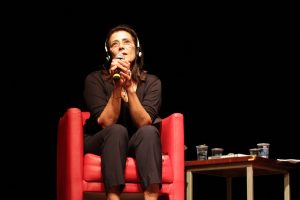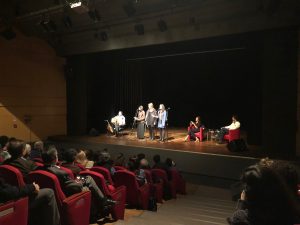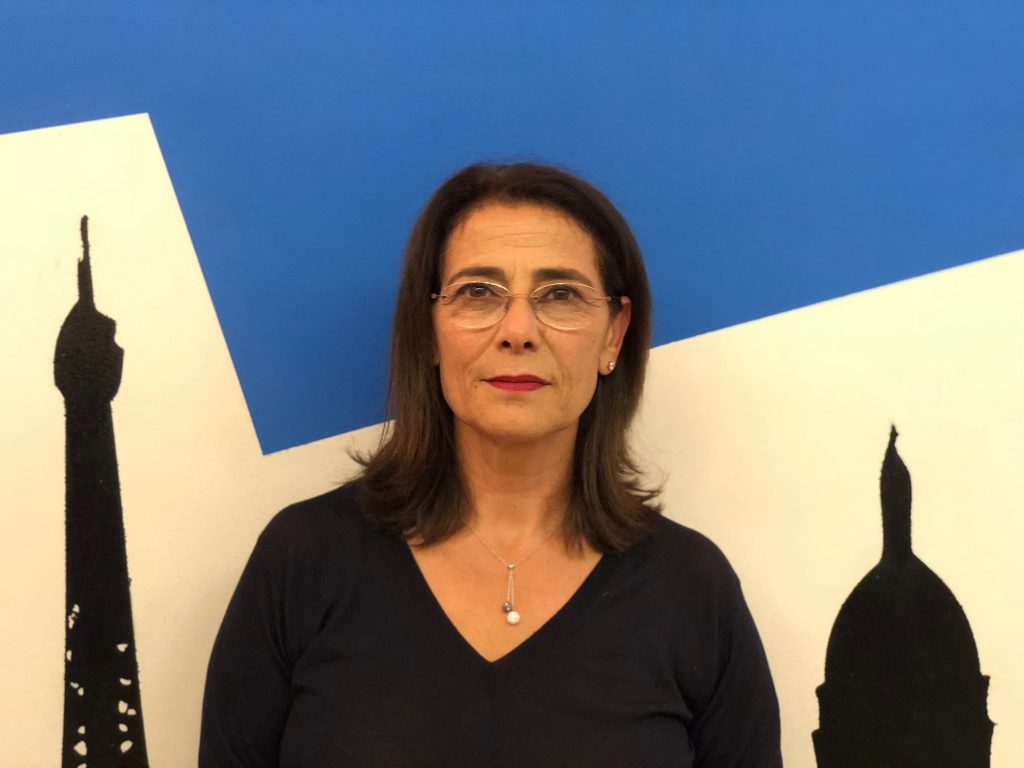São Paulo – “Fascism is a creation of the masses,” said Hiam Abbass, quoting an excerpt of the book “France Against the Robots”, by George Bernanos, in which she based her play of the same name. She’s touring Brazil with the play since last week. The actress and director (picture) received a tribute to her career this week in São Paulo and, during the event, at Aliança Francesa theater, Abbass talked to ANBA about her filmography, Arab cinema, her play, today’s fascism and the situation in Palestine.
“France Against the Robots” is a monologue produced by Abbass. She said she was shocked with the contemporaneity of the book, written in 1944. “My partner Jean-Baptiste Sastre acts and directs the play and this is our work, he read the book by Bernanos and, when I read it, I was surprised, because it’s like he had visualized today’s world,” she reveals.
Abbass says that Bernanos talks about fascism in his work “because he lived the Second World War, Mussolini, Hitler, Stalin,” and he began to criticize the Catholic Church after the Spanish Civil War, since it sided with dictator Francisco Franco. “As long as we live and think as mass, we will have fascists in power doing this; not only the human is fascist, but technology has become fascist in general, look to the people and what they’re doing with their phones and TVs, fascism is present everyday in our daily lives,” she said.
To Abbass, the narrative is “a description of his way (Bernanos’) of thinking modernism, the world of machines, the massive destruction caused by this new technology of the beginning of the 20th century, and the way he writes about this, analyses and connects the individuality of the human being to his life, to the dangers if we keep in this path.” The actress revealed that Bernanos address, in many moments, the young people, including the Brazilian youth (the writer lived in Brazil for ten years). “Young people is responsible for what’s going to happen from now on, since we won’t be here anymore,” she said.

“I’m very happy for learning about Brazil through the eyes of a great man and great thinker, to borrow the point of view of this author that lived here; he chose to live as a poor man, writing and teaching young people and people in general that were willing to think about how humanity is in danger.” The artist said that this is a fulfilling and exciting work, one of the most important in her career. “I think that Sastre and Gilles Bernanos (the grandson of the author, responsible for the book’s adaptation for the play) share this thinking with me; we shouldn’t neglect this point of view [of Bernanos] these days.”
The play opened first in France and toured for three cities. Here in Brazil, it was performed in Florianópolis and, after São Paulo, it will go to Rio de Janeiro, Juiz de Fora and Ouro Preto, always in theaters of Aliança Francesa in each of the cities that Bernanos visited or lived. Then, it returns to France for more dates, with plans to also go to Jerusalem and, next year, to the United States.
Early career
Abbass was born in Nazareth, a city of a predominantly Arab population in the current territory of Israel, and lived in a Palestinian village with her Arab family, where she studied, always showing an interest in the arts from an early age. “I always loved to act, was always very artistic from a very young age, I acted in a play in school as a little girl and thought it was all very magical,” she recalls.
In her teen years, she studied photography and it was in a photo session in a theater that she decided to join the theater company, where she stayed for six years. Later, the actress had small roles in two Palestinians movies.
She then decided to move to France, where she still lives, “to escape the censorship from both Israel and Palestine.” Initially, she did some Arab films, co-productions with Europe, such as Haifa and Satin Rouge. “I learned to speak Arabic with many accents and that allowed me to play roles of the Arab world from many countries, plus English and French; I like roles and stories that touch me in some way,” she says.
Hollywood
The presence of the Palestinian actress in Hollywood is, according to her, a sign of changes in recent years, despite fascism and prejudices being very much active in the global culture scene. “I think that September 11 opened some minds in the western world to try to understand who this enemy is, who are these terrorists, what is this cliché, this stereotype; and I believe that this process is jumpstarting a new way for creating Arab characters. I’m not saying that everyone is doing this, neither that it’s an easy process, but I’m saying that a door has opened.”
When asked about the issue of representation, of being an Arab woman in worldwide productions, the artist believes that “working together, our will and work can help bring the name of Palestine to a broader spectrum worldwide,” and that “each person has ambitions, dreams, and they should believe that they are able to fulfill these dreams and pursue them: ‘this is what is most important to me’; it’s good to tell them that it’s possible, but that it’s the result of a lot of work, it didn’t come from nowhere.”
Hiam Abbass believes that her work in Hollywood not necessarily helps to promote the Arab cinema. “I think that those interested in Arab cinema and culture already watches it, regardless if I’m in Hollywood, but yes, eventually, some people could follow this way, of getting to know me for these works and go searching for my previous ones, it can help in this sense.”
“Here in Brazil, for instance, people that have welcomed me know about the importance of this mix of cultures and knowledge that we can acquire by bringing people from different parts to talk to local artists, creating a new dialogue; art doesn’t know nationality, art’s only nationality is the arts, our identity is to be human before anything else,” she declared.
Her most recent works in the North American movie industry are a participation in “The OA” (2016), a Netflix series in which he played the part of Khatun, a type of an angel, and in the HBO series “Succession” (2018), where she plays the role of Marcia, one of the main characters and the wife of an American billionaire. “I couldn’t remain with the role in ‘The OA’ for the second season because I’m playing a main character in “Succession”, which is a series that criticizes the fascism of money. In this drama, I’m of Arab origins, but we still don’t know where this will lead in the future, but I talked with the writers and I’m loving to do the series because it exposes this power of wealth,” said the actress. She also had a part in “Blade Runner 2049”, where she played the replicant Freysa.
Inheritance
“Inheritance” is the only feature film directed by Abbass. She has directed three short films. “I have other ongoing projects to direct feature films, but I can’t talk much about them for now,” she said. According to Abbass, “this feature film tells the story of a community of Palestinians and how a person can fulfill her ambitions with so many traditions that can chain you up.” “Initially, it’s not about a political issue, but I decided to set the film in a war scenario, with parts in Israel and in Lebanon; the message is that life goes on.”
Palestine
The artist criticized the current conflicts in her home country. “If this Israeli government keep doing what they’re doing, I don’t see how a peaceful solution could emerge. It’s a very difficult situation and I feel very sorry for the people in Gaza, in the conflict areas, and in the prisons; Israel is playing a dirty game in the whole world, and it has the support of Trump, a rich, powerful man who doesn’t know anything about politics”.
Abbass again mentioned the work of Bernanos and its contemporaneity. “I think that if this is what is happening, if this is what humanity wants, I think that Bernanos is necessary so that, at least, we can be honest about how each of us can build something minimally positive to save humanity. Because Netanyahu (Israel’s prime minister) is not saving even the Israelis, how is he going to save Palestinians? Bernanos says that a country that isolates itself, that closes itself, is a country that negates its own identity. If Trump or Netanyahu could understand this, their policies would change,” she ensured.
Arab cinema
Abbass noted that most of the Arab productions she was involved in were co-productions with France, Germany and other countries, mainly European ones. “The number of young people, especially [Arab] women who are attempting to go across the border (literally and figuratively) to express their art as they see it, rather than how they were taught, is increasing. They are discussing issues like homosexuality and oppression on women and criticizing their leaders. The [Arab] revolution didn’t come from out of nowhere. It came from the perception of those people. I see a great generation of young people whom I see as the seeds of a future,” she said. The actress also claimed she does not approve of radicalism in any shape or form, and that no progress comes from separation or segregation.
The event

The Monday (17) event included a conversation with the actress, featuring musician Sami Bordokan and poetry interventions by actress Fernanda Azevedo of theater company Kiwi Cia. de Teatro and group Cabaré Feminista. The event was held by Beit21 in partnership with Alliance Française, with backing from the Federation of Muslim Associations in Brazil (Fambras) and the Arab Brazilian Chamber of Commerce. The Chamber’s International Relations vice president Osmar Chofi, cultural director Silvia Antibas, director Mohamad Murad and counselor Arthur Jafet were in attendance.
“Being honored for your work is one thing, but doing what you do because you believe you should be doing it, that’s the most important thing. And I like to think this is a moment for meeting people who like my work and for sharing with them,” she concluded.
Translated by Sérgio Kakitani and Gabriel Pomerancblum




